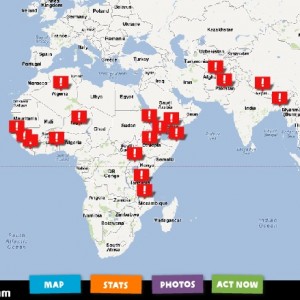Federal Water Tap, August 6: Drought, Oil Spill, Infrastructure
Before adjourning for a five-week vacation, the House of Representatives passed a US$383 million drought-relief bill, the Hill reports. To pay for it, farmland conservation programs will be cut. Critics say that this is short-sighted because these programs protect, among others things, the soil’s ability to hold moisture.
“If Congress is serious about assisting farmers in the long term and helping minimize the impacts of the droughts that are likely in coming years, it should increase funding for conservation programs,” said Justin Tatham, of the Union of Concerned Scientists Food and Environment Program.
Because the cuts to conservation programs are greater than the amount allocated for drought relief, the Congressional Budget Office estimates the bill would reduce federal spending by US$256 million over 10 years.
The Senate did not act on the bill before leaving town.
Coal Mining
A federal judge tossed out guidance from the U.S. Environmental Protection Agency that aimed to reduce water pollution from coal mining. The Charleston Gazette reports that it is the third court ruling this year to go against the EPA’s attempts to regulate mountaintop removal.
Oil Spill
On July 27, a Houston-based subsidiary of a Canadian pipeline company spilled more than 189,000 liters (50,000 gallons) from a ruptured 60-centimeter (24-inch) line in Wisconsin. The federal agency overseeing pipeline safety ordered Enbridge Energy Partners to shut down a 467-mile segment of the Lakehead pipeline system until the company submits an approved management plan.
In its corrective action order, the Pipeline and Hazardous Materials Safety Administration noted that the company has a “history of failures…throughout all parts of the Lakehead system.” In July 2010, more than 3.2 million liters (840,000 gallons) of diluted bitumen from the Alberta tar sands spilled from an Enbridge pipeline into Michigan’s Kalamazoo River.
Update 8/6/12: PHMSA has given Enbridge the green light to resume pumping on Line 14. The company will reduce pumping pressure in the line until PHMSA approves a return to full operations. The restart plan can be found here.
Water Infrastructure Financing
Rep. Earl Blumenauer (D-Ore.) introduced a bill to create a trust fund for water infrastructure. Revenue would come from a tax on products that are commonly disposed of through the sewer system—soaps, detergents, cooking oils, pharmaceuticals—and on plastic containers used for water-based beverages. He estimates the taxes would raise US$6.5 billion per year, which would be distributed through the Clean Water State Revolving Fund, a federal loan program.
Nevada Pipeline
The Bureau of Land Management has proposed excluding an aquifer on the Nevada-Utah border from a groundwater-pumping plan being pursued by the water agency that supplies the Las Vegas area. The BLM, which did not evaluate water rights because that is the state’s domain, approved a 306-mile pipeline, along with associated facilities, to deliver water to the Southern Nevada Water Authority.
Florida Phosphorus
After rejecting certain water quality standards proposed by the state of Florida to protect the Everglades, the EPA, under court order, has identified which standards are unacceptable.
Get the Lead Out
The EPA is hosting a public meeting to discuss how to implement an amendment to the Safe Drinking Water Act. Taking effect in 2014, the amendment changes the definition of “lead free.” Register by sending an email to junie.percy@itsysteminc.com by August 15.
Federal Water Tap is a weekly digest spotting trends in U.S. government water policy. To get more water news, follow Circle of Blue on Twitter and sign up for our newsletter.
Brett writes about agriculture, energy, infrastructure, and the politics and economics of water in the United States. He also writes the Federal Water Tap, Circle of Blue’s weekly digest of U.S. government water news. He is the winner of two Society of Environmental Journalists reporting awards, one of the top honors in American environmental journalism: first place for explanatory reporting for a series on septic system pollution in the United States(2016) and third place for beat reporting in a small market (2014). He received the Sierra Club’s Distinguished Service Award in 2018. Brett lives in Seattle, where he hikes the mountains and bakes pies. Contact Brett Walton





Leave a Reply
Want to join the discussion?Feel free to contribute!